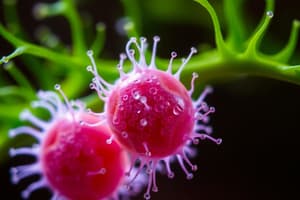Podcast
Questions and Answers
What role does natural selection play in the evolution of species?
What role does natural selection play in the evolution of species?
- It increases the likelihood of beneficial traits being inherited. (correct)
- It favors traits that decrease survival and reproduction.
- It has no impact on the genetic diversity of populations.
- It allows all traits to be equally passed to offspring.
Which process directly utilizes light energy to produce chemical energy in plants?
Which process directly utilizes light energy to produce chemical energy in plants?
- Photosynthesis (correct)
- Cellular respiration
- Mitosis
- Nutrient uptake
How does biodiversity contribute to ecosystem stability?
How does biodiversity contribute to ecosystem stability?
- It limits the available habitats for organisms.
- It decreases interspecies competition.
- It allows for a variety of ecological interactions. (correct)
- It ensures a higher rate of extinction.
In which biological process is glucose broken down to release energy?
In which biological process is glucose broken down to release energy?
What is a significant outcome of advances in biological knowledge?
What is a significant outcome of advances in biological knowledge?
What does cell theory state about living organisms?
What does cell theory state about living organisms?
Which field of biology primarily focuses on the functions and interactions of living organisms and their parts?
Which field of biology primarily focuses on the functions and interactions of living organisms and their parts?
What process describes the changes in populations of organisms over time due to natural selection?
What process describes the changes in populations of organisms over time due to natural selection?
Which branch of biology investigates the relationships between organisms and their environment?
Which branch of biology investigates the relationships between organisms and their environment?
Which of the following statements accurately defines metabolism?
Which of the following statements accurately defines metabolism?
What is the primary focus of molecular biology?
What is the primary focus of molecular biology?
Which of the following correctly describes homeostasis?
Which of the following correctly describes homeostasis?
Which area of biology encompasses the study of microorganism impacts on other life forms and environments?
Which area of biology encompasses the study of microorganism impacts on other life forms and environments?
Flashcards
Natural Selection
Natural Selection
The process where organisms with traits that help them survive and reproduce in their environment are more likely to pass those traits on to their offspring.
Adaptation
Adaptation
An inherited characteristic that helps an organism survive and reproduce in its specific environment.
Biodiversity
Biodiversity
The variety of life on Earth, encompassing all levels from genes to ecosystems.
Photosynthesis
Photosynthesis
Signup and view all the flashcards
Cellular Respiration
Cellular Respiration
Signup and view all the flashcards
Biology
Biology
Signup and view all the flashcards
Cell Biology
Cell Biology
Signup and view all the flashcards
Genetics
Genetics
Signup and view all the flashcards
Microbiology
Microbiology
Signup and view all the flashcards
Ecology
Ecology
Signup and view all the flashcards
Evolution
Evolution
Signup and view all the flashcards
Physiology
Physiology
Signup and view all the flashcards
Cell Theory
Cell Theory
Signup and view all the flashcards
Study Notes
Biological Sciences Overview
- Biology is the study of life, encompassing a vast range of organisms and their interactions with each other and their environments.
- Key areas of study within biology include:
- Molecular biology: focusing on the structure and function of molecules within living organisms, such as DNA, RNA and proteins.
- Cell biology: examining the structure, function, and behavior of cells.
- Genetics: investigating heredity and the variation of traits among organisms.
- Microbiology: studying microorganisms and their impact on other organisms and the environment.
- Ecology: Exploring the interactions of organisms with each other and their environment.
- Evolution: analyzing the processes and patterns of change in organisms over time.
- Physiology: investigating the biological functions of organisms.
- Biologists employ a range of methods, techniques, and tools to gather and analyze data. These may include observation, experimentation, modeling, and quantitative analysis.
- The field constantly evolves as new discoveries and technologies emerge.
Branches of Biology
- Botany: The study of plants, encompassing their structure, function, evolution, and distribution.
- Zoology: The study of animals, including their diversity, behavior, physiology, and interactions.
- Microbiology: The study of microscopic organisms such as bacteria, viruses, fungi, and protists.
- Genetics: The study of heredity and the variation of traits among organisms.
- Ecology: The study of interactions between organisms and their environment, including the flow of energy and nutrients.
- Molecular Biology: The study of biological processes at the molecular level, examining the structure and function of molecules like DNA, RNA, and proteins.
- Physiology: The study of the functions of living organisms and their parts, including how those functions work collectively.
- Evolutionary Biology: The study of the evolutionary processes that have shaped the diversity of life on Earth.
Biological Concepts
- Cell Theory: All living organisms are composed of cells, which are the basic unit of life.
- Homeostasis: The ability of an organism to maintain a relatively stable internal environment.
- Metabolism: The sum of all chemical reactions that occur within an organism.
- Evolution: The process by which populations of organisms change over time through natural selection.
- Natural Selection: The mechanism by which traits that increase an organism's survival and reproduction are more likely to be passed on to offspring.
- Adaptation: An inherited trait that enhances an organism's ability to survive and reproduce in a particular environment.
- Biodiversity: The variety of life on Earth at all levels, from genes to ecosystems.
Biological Processes
- Cell division, including mitosis and meiosis, for growth, repair, and reproduction.
- Photosynthesis, the process by which plants convert light energy into chemical energy.
- Cellular respiration, the process by which organisms break down glucose to release energy.
- Genetic transfer, including DNA replication, transcription, and translation.
- Nutrient cycling within ecosystems, involving processes like decomposition and nutrient uptake.
- Energy flow through ecosystems, typically following the sun as the primary energy source, and the transfer of energy through trophic levels.
Importance of Biology
- Understanding Biology is crucial for addressing global challenges, including:
- Diseases: Investigating the causes, treatments, and prevention strategies for various illnesses.
- Food production: Improving agricultural yields and developing sustainable food systems.
- Environmental problems: Evaluating and mitigating the impact of human activities on the environment.
- Conservation efforts: Understanding the importance of biodiversity and protecting endangered species.
- Human health: Gaining insight into the human body's functions and promoting wellness.
- Advances in biological knowledge contribute to technological advancements, such as medical treatments, biotechnology, and renewable energy sources.
Studying That Suits You
Use AI to generate personalized quizzes and flashcards to suit your learning preferences.




